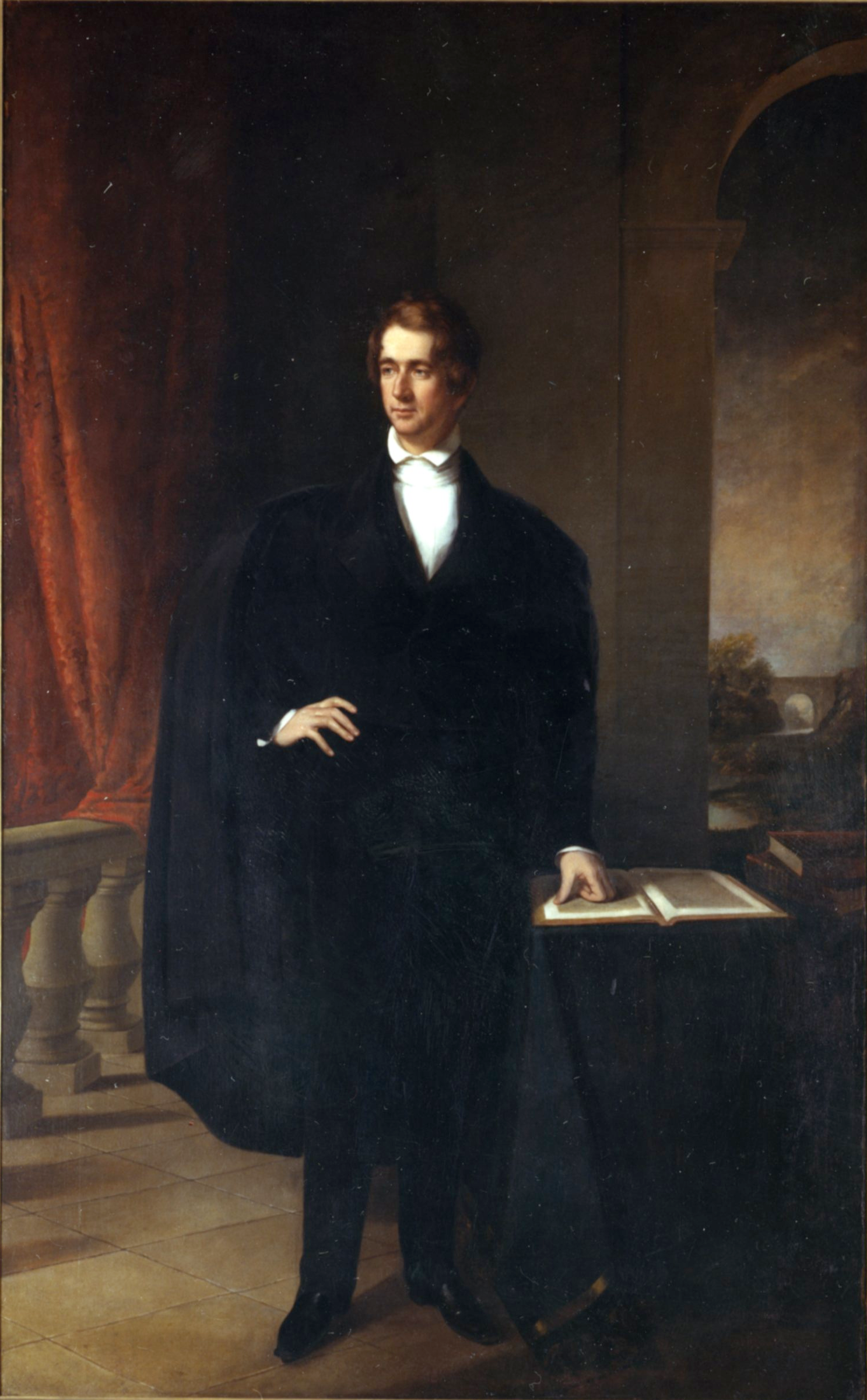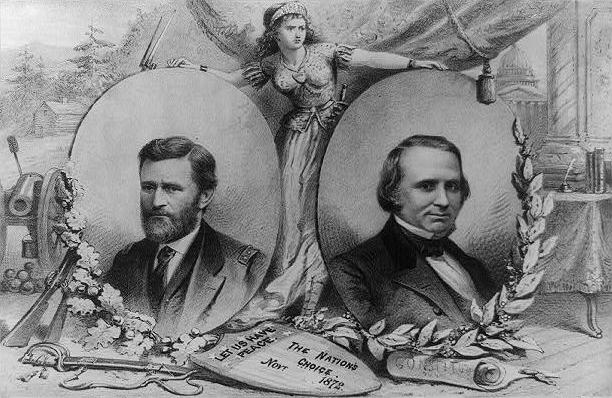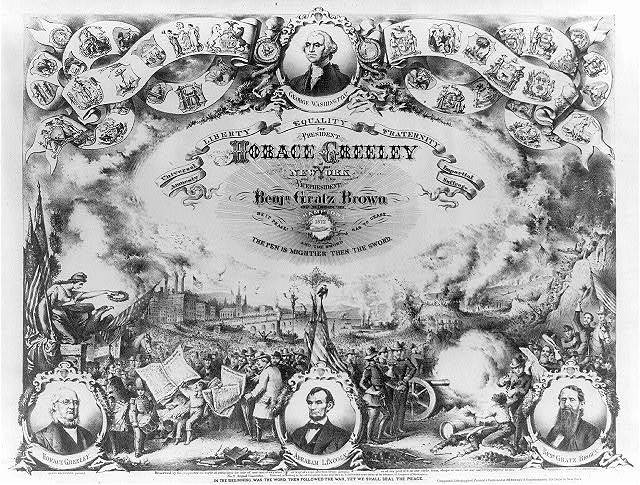|
Party Switching In The United States
In politics of the United States, party switching is any change in Political party, party affiliation of a partisan public figure, usually one who holds an elected office. Use of the term "party switch" can also connote a transfer of holding power in an elected governmental body from one party to another. History 19th century The first two major parties in the United States were the Federalist Party and the Democratic-Republican Party. The Federalists experienced success in the 1790s but lost power in the 1800 United States elections, 1800 elections and collapsed after the War of 1812. Many former Federalists, including John Quincy Adams, became members of the Democratic-Republican Party. After the 1824 United States presidential election, 1824 presidential election, the Democratic-Republicans fractured between supporters of Adams and supporters of Andrew Jackson. Jackson's followers formed the Democratic Party, while those who supported Adams formed the National Republican Par ... [...More Info...] [...Related Items...] OR: [Wikipedia] [Google] [Baidu] |
United States
The United States of America (USA), also known as the United States (U.S.) or America, is a country primarily located in North America. It is a federal republic of 50 U.S. state, states and a federal capital district, Washington, D.C. The 48 contiguous states border Canada to the north and Mexico to the south, with the semi-exclave of Alaska in the northwest and the archipelago of Hawaii in the Pacific Ocean. The United States asserts sovereignty over five Territories of the United States, major island territories and United States Minor Outlying Islands, various uninhabited islands in Oceania and the Caribbean. It is a megadiverse country, with the world's List of countries and dependencies by area, third-largest land area and List of countries and dependencies by population, third-largest population, exceeding 340 million. Its three Metropolitan statistical areas by population, largest metropolitan areas are New York metropolitan area, New York, Greater Los Angeles, Los Angel ... [...More Info...] [...Related Items...] OR: [Wikipedia] [Google] [Baidu] |
William Seward
William Henry Seward (; May 16, 1801 – October 10, 1872) was an American politician who served as United States Secretary of State from 1861 to 1869, and earlier served as governor of New York and as a United States senator. A determined opponent of the spread of slavery in the years leading up to the American Civil War, he was a prominent figure in the Republican Party in its formative years, and was praised for his work on behalf of the Union as Secretary of State during the Civil War. He also negotiated the treaty for the United States to purchase the Alaska Territory. Seward was born in 1801 in the village of Florida, in Orange County, New York, where his father was a farmer and owned slaves. He was educated as a lawyer and moved to the Central New York town of Auburn. Seward was elected to the New York State Senate in 1830 as an Anti-Mason. Four years later, he became the gubernatorial nominee of the Whig Party. Though he was not successful in that race, Seward ... [...More Info...] [...Related Items...] OR: [Wikipedia] [Google] [Baidu] |
Silver Republican Party
The Silver Republican Party, later known as the Lincoln Republican Party, was a United States political party from 1896 to 1901. It was so named because it split from the Republican Party by supporting free silver (effectively, expansionary monetary policy) and bimetallism. The main Republican Party opposed free silver and supported the gold standard. Silver Republican strength was concentrated in the Western states where silver mining was an important industry. A leading spokesman in the House of Representatives was Willis Sweet of Idaho. Silver Republicans were elected to the Congress from several Western states. In both the 1896 and 1900 presidential elections, Silver Republicans supported Democratic presidential nominee William Jennings Bryan over Republican nominee William McKinley. In 1901, the Silver Republican Party disbanded and most of its members rejoined the Republican Party, particularly after Theodore Roosevelt became president in September 1901. However, some ... [...More Info...] [...Related Items...] OR: [Wikipedia] [Google] [Baidu] |
Monetary Policy
Monetary policy is the policy adopted by the monetary authority of a nation to affect monetary and other financial conditions to accomplish broader objectives like high employment and price stability (normally interpreted as a low and stable rate of inflation). Further purposes of a monetary policy may be to contribute to economic stability or to maintain predictable exchange rates with other currencies. Today most central banks in developed countries conduct their monetary policy within an inflation targeting framework, whereas the monetary policies of most developing countries' central banks target some kind of a fixed exchange rate system. A third monetary policy strategy, targeting the money supply, was widely followed during the 1980s, but has diminished in popularity since then, though it is still the official strategy in a number of emerging economies. The tools of monetary policy vary from central bank to central bank, depending on the country's stage of development, inst ... [...More Info...] [...Related Items...] OR: [Wikipedia] [Google] [Baidu] |
1872 United States Presidential Election
United States presidential election, Presidential elections were held in the United States on November 5, 1872. Incumbent President of the United States, President Ulysses S. Grant, the Republican Party (United States), Republican nominee, easily defeated Democratic Party (United States), Democratic-endorsed Liberal Republican Party (United States), Liberal Republican nominee Horace Greeley. Grant was unanimously re-nominated at the 1872 Republican National Convention, but his intra-party opponents organized the Liberal Republican Party and held their own convention. The 1872 Liberal Republican convention nominated Greeley, a New York newspaper publisher, and wrote a platform calling for U.S. Civil Service Reform, civil service reform and an end to Reconstruction Era, Reconstruction. Democratic Party (United States), Democratic Party leaders believed that their only hope of defeating Grant was to unite around Greeley, and the 1872 Democratic National Convention nominated the Libe ... [...More Info...] [...Related Items...] OR: [Wikipedia] [Google] [Baidu] |
Liberal Republican Party (United States)
The Liberal Republican Party was an American political party that was organized in May 1872 to oppose the reelection of President Ulysses S. Grant and his Radical Republican supporters in the 1872 United States presidential election, presidential election of 1872. The party emerged in Missouri under the leadership of Senator Carl Schurz and soon attracted other opponents of Grant; Liberal Republicans decried the scandals of the Grant administration and sought U.S. Civil Service Reform, civil service reform. The party opposed Grant's Reconstruction Era, Reconstruction policies, particularly the Enforcement Acts. It lost in a landslide, and disappeared from the national stage after the 1872 election. The History of the United States Republican Party, Republican Party had emerged as the dominant party in the aftermath of the Civil War, but many original Republicans became dissatisfied with the leadership of President Grant. Prominent Classical liberal, liberal leaders like Schurz, Ch ... [...More Info...] [...Related Items...] OR: [Wikipedia] [Google] [Baidu] |
Ulysses S
Ulysses is the Latin Latin ( or ) is a classical language belonging to the Italic languages, Italic branch of the Indo-European languages. Latin was originally spoken by the Latins (Italic tribe), Latins in Latium (now known as Lazio), the lower Tiber area aroun ... name for Odysseus, a legendary Greek hero recognized for his intelligence and cunning. He is famous for his long, adventurous journey home to Ithaca after the Trojan War, as narrated in Homer's Odyssey. Ulysses may also refer to: People * Ulysses (given name), including a list of people with this name Places * 5254 Ulysses, an asteroid Places in the United States * Ulysses, Kansas * Ulysses, Kentucky * Ulysses, Nebraska * Ulysses Township, Butler County, Nebraska * Ulysses, New York * Ulysses, Pennsylvania * Ulysses Township, Pennsylvania Animals * Ulysses butterfly (''Papilio ulysses'') a butterfly endemic to Australasia * Ulysses (horse) (born 2013), a thoroughbred racehorse Arts and enter ... [...More Info...] [...Related Items...] OR: [Wikipedia] [Google] [Baidu] |
Radical Republican
The Radical Republicans were a political faction within the Republican Party originating from the party's founding in 1854—some six years before the Civil War—until the Compromise of 1877, which effectively ended Reconstruction. They called themselves "Radicals" because of their goal of immediate, complete, and permanent eradication of slavery in the United States. However, the Radical faction also included strong currents of nativism, anti-Catholicism, and support for the prohibition of alcoholic beverages. These policy goals and the rhetoric in their favor often made it extremely difficult for the Republican Party as a whole to avoid alienating large numbers of American voters of Irish Catholic, German, and other White ethnic backgrounds. In fact, even German-American Freethinkers and Forty-Eighters who, like Hermann Raster, otherwise sympathized with the Radical Republicans' aims, fought them tooth and nail over prohibition. They later became known as " Stalwarts". ... [...More Info...] [...Related Items...] OR: [Wikipedia] [Google] [Baidu] |
American Civil War
The American Civil War (April 12, 1861May 26, 1865; also known by Names of the American Civil War, other names) was a civil war in the United States between the Union (American Civil War), Union ("the North") and the Confederate States of America, Confederacy ("the South"), which was formed in 1861 by U.S. state, states that had Secession in the United States, seceded from the Union. The Origins of the American Civil War, central conflict leading to war was a dispute over whether Slavery in the United States, slavery should be permitted to expand into the western territories, leading to more slave states, or be prohibited from doing so, which many believed would place slavery on a course of ultimate extinction. Timeline of events leading to the American Civil War, Decades of controversy over slavery came to a head when Abraham Lincoln, who opposed slavery's expansion, won the 1860 presidential election. Seven Southern slave states responded to Lincoln's victory by seceding f ... [...More Info...] [...Related Items...] OR: [Wikipedia] [Google] [Baidu] |
Reconstruction Era
The Reconstruction era was a period in History of the United States, US history that followed the American Civil War (1861-65) and was dominated by the legal, social, and political challenges of the Abolitionism in the United States, abolition of slavery and reintegration of the former Confederate States of America, Confederate States into the United States. Reconstruction Amendments, Three amendments were added to the United States Constitution to grant citizenship and equal civil rights to the Freedmen, newly freed slaves. To circumvent these, former Confederate states imposed poll taxes and literacy tests and engaged in terrorism in the United States, terrorism to intimidate and control African Americans and discourage or prevent them from voting. Throughout the war, the Union was confronted with the issue of how to administer captured areas and handle slaves escaping to Union lines. The United States Army played a vital role in establishing a Labour economics, free lab ... [...More Info...] [...Related Items...] OR: [Wikipedia] [Google] [Baidu] |
1860 United States Presidential Election
Presidential elections were held in the United States on November 6, 1860. The Republican Party ticket of Abraham Lincoln and Hannibal Hamlin emerged victorious in a four-way race. With an electoral majority composed only of Northern states that had already abolished slavery, and minimal support in the Democratic-dominated Southern slave states, Lincoln's election as the first Republican president thus served as the main catalyst for Southern secession and consequently the American Civil War. The United States had become sectionally divided during the 1850s, primarily over extending slavery into the western territories. Furthermore, uncompromising pro-slavery elements clashed with those in favor of compromise; this created four main parties in the 1860 election, each with their own presidential candidate. The incumbent president, James Buchanan, like his predecessor, Franklin Pierce, was a Northern Democrat with Southern sympathies. Buchanan also adamantly promised not ... [...More Info...] [...Related Items...] OR: [Wikipedia] [Google] [Baidu] |







